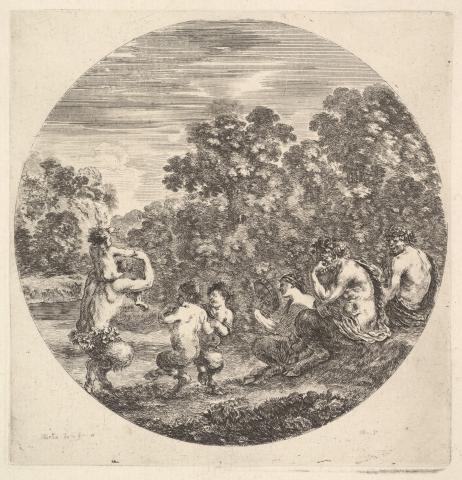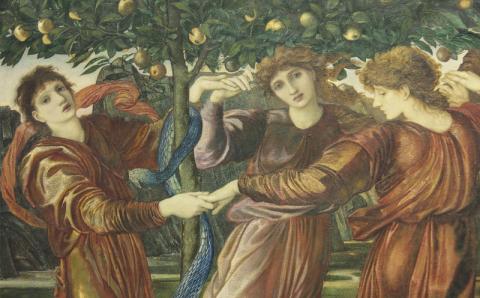Īnfernē viridī dēnsantur rōbora fronde:
Silvānō et Satyrīs efficit umbra domōs.
Pōpulus hīc, corylīque decus, fāgusque pirusque, 15
et cerasus, prūnus, castaneaeque nucēs,
et plantae innumerae mortālibus ēsca beātīs
quae sunt dīvōrum mūnera caelicolum.
Flāva Cerēs dextrā mortālēs vertere terram,
et serere, et messēs condere, sponte docet. 20
Pan laevā, Arctoum mundus quā surgit ad axem,
pascere dat passim grāmina laeta gregī.
Citrea māla rubent, vallis quā tendit ad īmum,
quālia fert rutilāns hortulus Hesperidum:
et laurī frondēs, victōrum praemia quondam, 25
quaeque poētārum texere serta solent:
et myrtus Venerī sacra crispātur in umbrā:
cūncta placent frūctū, flōribus ac redolent.
notes
There are dense forests with many types of trees, fruits, and nuts. There are tilled agricultural lands to the south, and pasture lands to the north. There are citrus trees, laurel, and myrtle.
13 Īnfernē: adverbial, "down below."
13 viridī fronde: ablative of means with dēnsantur. Using a singular for a plural is common in poetry, “with a green bough.”
14 efficit: umbra is the subject of efficit, “its shade provides homes for” + the datives Silvānō et Satyrīs.
15 Pōpulus: "poplar" starts a list of trees. Supply est.
15 corylīque decus: "and the lovely hazel tree," lit. "the loveliness of the hazel" (a common poeticism, see OLD decus 5.a).
17 ēsca: in apposition with plantae, “food.”
19 Flāva: the goddess of grain, Ceres, is normally described by the poets as "pale yellow" or "golden" because of the color of ripe wheat.
19 dextrā: adverbial, "on the right." Answered by laevā, “on the left” in line 21.
19 vertere ... serere ... condere: are all infinitives governed by docet. I.e. Ceres teaches the mortals to do all these things.
20 messēs condere: “to harvest (the crops),” but the verb condere can also carry the sense of, “to put away the things that have been harvested.” So it could be taken as, “to harvest the crops and put up the harvests.”
20 sponte: “of her own volition.”
21 Arctoum mundus quā surgit ad axem: "where (quā) the sky (LS mundus II.B.2.b) rises toward its northern axis," i.e. in the north.
22 Pascere: an infinitive used with the force of a purpose clause, "to feed on."
22 dat: Pan (from line 21) is the subject.
22 passim: adverbial, “far and wide.” I.e. the grasses are spread far and wide.
22 gregī: "for the herd."
23 Citrea māla: “citrons.” They cannot endure frost, so they are a common crop in warmer climates, like this region of Portugal. Pliny the Elder mentions them (Natural History 13.31, 15.47) as does Martial (Epigrams 13.37).
23 rubent: "ripen," rather than “redden.”
23 quā: "where," “in the place where.”
24 qualia: "of the sort," hyperbolically comparing the citrons at Syntra to the fabled Apples of the Hesperides, fetched by Hercules on the eleventh of his canonical labors.
24 rutilāns: "glowing with a red or golden color," a poetic synonym for rubēns. It modifies hortulus but may be a transferred epithet, properly applying to the fruit itself.
25 praemia: in apposition with lauri frondes, “rewards,” “prizes.”
26 poētārum ... serta: "poet's wreathes." In antiquity winners of poetry competitions received laurel wreaths as a prize. Famous poets such as Dante were often depicted wearing a laurel wreath.
26 texere: active even though one would expect a passive. The lauri frondes are weaving the serta.
27 Venerī sacra: in apposition with myrtus, “the myrtle, sacred to Venus.”
27 crispātur: "curls" (OLD crispo 1), or perhaps "quivers" (OLD 3.b). See Claudian, The Rape of Persephone 2.110, denso crispata cacumine buxus.
28 fructū: ablative of respect, as is floribus in the next clause. Cūncta placent frūctū, flōribus ac redolent: “all things are pleasing with respect to their fruit, and are fragrant with respect to their flowers.”
vocabulary
īnfernus –a –um: below
viridis –e: green
dēnsō –āre –āvī –ātus: to thicken, condense; to press close together
rōbur rōboris n.: oak tree
frōns frondis f.: foliage, branch, bough
Silvānus –ī m.: Silvanus, the god who presides over woods (> silva)
satyrus (saturus) –ī m.: a satyr
pōpulus –ī f.: a poplar tree 15
corylus (corulus) –ī f.: a hazel-tree
fāgus –ī f.: beech–tree
pirus –ī f.: a pear-tree
cerasus –ī f.: a cherry-tree
prūnus –ī f.: a plum tree
castanea –ae f.: the chestnut-tree
nux nucis f.: nut
planta –ae f.: a sprout, twig, plant
innumerus –a –um: countless
ēsca –ae f.: food (> edo)
caelicola –ae m./f.: an inhabitant of heaven; a god, et al. (> caelum and colo)
flāvus –a –um: golden, yellow
Cerēs Cereris f.: wheat; Ceres
serō serere sēvī satum: to sow (a crop) 20
messis –is f.: harvest
sponte: of one's own will; voluntarily; for one's own sake
Pān Pānos (acc. Pāna) m.: Pan, the god of fields and woods
laevus –a –um: left, on the left side
arctōus –a –um: arctic, northern
axis axis m.: axis, north pole
pāscō pāscere pāvī pāstum: to nourish, feed; pasture
passim: here and there, indiscriminately
grāmen –inis n. : grass, plant, herb
grex gregis m.: herd, flock
citreus –a –um: of the citrus–tree; citrea mala = citrons
rubeō rubēre rubuī: to be red, be ruddy
vallēs vallis f.: valley
īmus –a –um: the lowest, deepest
rutilō rutilāre rutilāvī rutilātus: to redden; gleam
hortulus –ī m.: garden (dim. of hortus)
Hesperis –idis f.; pl. Hesperides –um : the daughters of Hesperus, the Hesperides, called also daughters of Erebus and Nox, to whom was given the care of the fabled gardens of the Hesperides, in an island of the Atlantic west of Mount Atlas
laurus –ī f.: laurel 25
frōns frondis f.: foliage, branch, bough
texō –ere –texuī –textus: to weave
serta –ōrum n.pl. or –a –ae f.: things entwined; garlands, wreaths
myrtus –ī m./f.: myrtle
Venus –eris f. : Venus, goddess of love and beauty, identified by the Romans with Aphrodite, daughter of Jupiter and Dione; (meton.), love, lust
crīspō crīspāre ––– crīspātus : to crisp, curl; to swing, vibrate, brandish
redoleō –ēre –uī : to give forth a smell; to be redolent of, fragrant with






